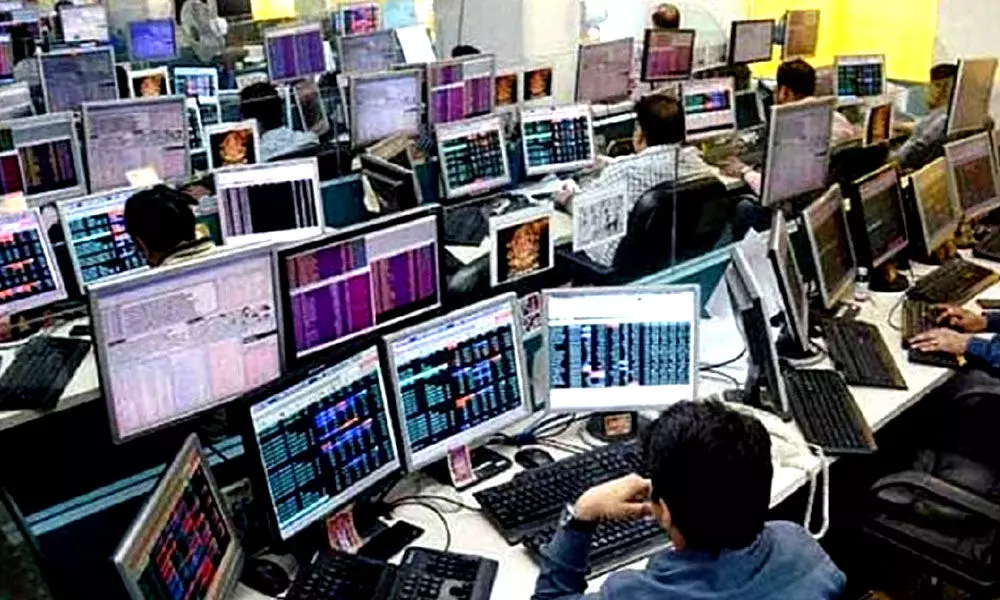World shares track Wall St decline as bond yields rebound
The dial ticks back to rising bond yield concerns, between that and the broad risk-on mood derived from the global economic recovery
image for illustrative purpose

Bangkok: WORLD shares fell on Thursday, tracking a decline on Wall Street as another rise in bond yields rattled investors who worry that higher inflation may prompt central banks to raise ultra-low interest rates. Benchmarks were lower in most major markets and the dollar rose against the Japanese yen. Shares have yo-yoed recently with fluctuations in bond yields. When yields rise quickly, as they have in recent weeks, it forces Wall Street to rethink the value of stocks. Technology stocks are most vulnerable to this reassessment after having soared during the pandemic, making them look pricier than the rest of the market. US government bond yields have rebounded after easing earlier in the week. The yield on the benchmark 10-year Treasury note slipped back to 1.45 per cent on Thursday after rising to 1.48 per cent earlier in the day.
"The dial ticks back to rising bond yield concerns, between that and the broad risk-on mood derived from the global economic recovery," Jingyi Pan of IG said in a report. She noted that stocks more affected by ups and downs in economic cycles were faring relatively well. Germany's DAX lost 0.4 per cent to 14,028.59 and the CAC 40 in Paris edged 0.1 per cent lower to 5,823.28. Britain's FTSE 100 gave up 0.8 per cent to 6,623.47. U.S. futures looked set for a sluggish start, with the future for the S&P 500 trading 0.1 per cent lower while the future for the Dow industrials was almost unchanged. In Asian trading, Japan's Nikkei 225 lost 2.1 per cent to 28,930.11 and the Hang Seng in Hong Kong dropped 2.2 per cent to 29,236.79. Australia's S&P/ASX 200 lost 0.8 per cent to 6,760.70.
The Shanghai Composite Index shed 2.1 per cent to 3,503.49. Investors are anticipating that policies outlined during the annual session of the National People's Congress, a largely ceremonial legislature that convenes on Friday, may point to a tightening of monetary and government stimulus.
South Korea's Kospi lost 1.3 per cent to 3,043.49 after the central bank reported the economy contracted in 2020 for the first time since 1998. Preliminary data released by the Bank of Korea on Thursday showed the gross domestic product fell 1 per cent from 2019, in the first annual contraction since South Korea was in the midst of a crippling financial crisis in 1998.
The US Dollar rose to 107.29 Japanese yen, its highest level in seven months, from 106.99 yen late Wednesday. Higher yields and interest rates would tend to push the greenback higher. The euro slipped to $1.2039 from $1.2066. On Wednesday, the S&P 500 dropped 1.3 per cent to 3,819.72, shedding an early gain.
The Dow Jones Industrial Average slipped 0.4 per cent to 31,270.09. The technology-heavy Nasdaq composite lost 2.7 per cent, to 12,997.75. Traders also sold off smaller company stocks, dragging the Russell 2000 index 1.1 per cent lower to 2,207.79. Wall Street continues to look to Washington, where economic data, comments out of the Federal Reserve and President Joe Biden's stimulus package remain front and centre. Treasury yields hit the psychologically important 1.50 per cent mark last week as investors braced for stronger economic growth but also a possible increase in inflation.
Federal Reserve Chair Jay Powell will speak on Thursday on monetary policy. Investors heard from him last week when he testified in front of Congress, but the format - a question-and-answer session with The Wall Street Journal - may be more illuminating than Powell's calculated answers to politicians.
Investors are looking ahead to the February jobs report on Friday. Economists surveyed by FactSet expect employers created 225,000 jobs last month. The report also includes numbers for how much wages are rising across the economy, a key component of inflation.

